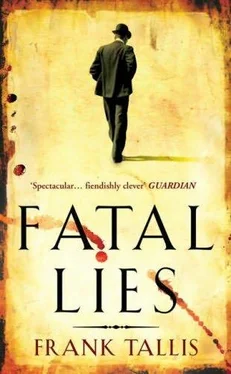Frank Tallis - Fatal Lies
Здесь есть возможность читать онлайн «Frank Tallis - Fatal Lies» весь текст электронной книги совершенно бесплатно (целиком полную версию без сокращений). В некоторых случаях можно слушать аудио, скачать через торрент в формате fb2 и присутствует краткое содержание. Жанр: Исторический детектив, на английском языке. Описание произведения, (предисловие) а так же отзывы посетителей доступны на портале библиотеки ЛибКат.
- Название:Fatal Lies
- Автор:
- Жанр:
- Год:неизвестен
- ISBN:нет данных
- Рейтинг книги:3 / 5. Голосов: 1
-
Избранное:Добавить в избранное
- Отзывы:
-
Ваша оценка:
- 60
- 1
- 2
- 3
- 4
- 5
Fatal Lies: краткое содержание, описание и аннотация
Предлагаем к чтению аннотацию, описание, краткое содержание или предисловие (зависит от того, что написал сам автор книги «Fatal Lies»). Если вы не нашли необходимую информацию о книге — напишите в комментариях, мы постараемся отыскать её.
Fatal Lies — читать онлайн бесплатно полную книгу (весь текст) целиком
Ниже представлен текст книги, разбитый по страницам. Система сохранения места последней прочитанной страницы, позволяет с удобством читать онлайн бесплатно книгу «Fatal Lies», без необходимости каждый раз заново искать на чём Вы остановились. Поставьте закладку, и сможете в любой момент перейти на страницу, на которой закончили чтение.
Интервал:
Закладка:
Liebermann reached down and picked up a book from the floor. He opened it and examined the frontispiece.
“I notice, Herr Sommer, that you have purchased a new dictionary,” said the young doctor.
“Why, yes,” Sommer replied. “My other one was getting old.”
“Not so old, surely. It was-I believe-a Hartel and Jacobsen… and was published only three years ago.”
“You are most observant, Herr Doctor,” said Sommer. “Yes, I did have a Hartel and Jacobsen, but…” He swallowed, and his Adam's apple bobbed up and down. “It wasn't very good on technical terms. Not enough detail. My new dictionary is much better suited to my purposes.”
Liebermann turned and walked back across the room. He sat on a stool, opened his bag, and pulled out a large green volume.
“Then why, Herr Sommer,” said Liebermann, “were you so anxious to acquire this?”
The color drained from the mathematics master's face.
“What… what is it?” The hollowness of Sommer's voice betrayed the insincerity of his question.
“Thomas Zelenka's Hartel and Jacobsen dictionary.”
For several seconds the mathematics master presented a blank visage-as if the efferent nerves supplying his face with emotional expressivity had suddenly been severed with a cheese wire. Then, quite suddenly, a burst of galvanic twitches preceded a loud exclamation.
“Ah yes-of course,” cried Sommer, clapping his hands together. “You must have heard something or other from that boy Wolf!”
“Indeed,” said Rheinhardt.
“Yes… you see, it's a rather expensive dictionary and one thatI'm ashamed to say-I recommended to Zelenka. I should have given the matter more thought, particularly given Zelenka's enthusiasm for the sciences. As you know, Zelenka came from a poor family, so, on my return from Linz, I naturally wanted to make sure that this very valuable item had been safely returned-with the rest of his effects-to his parents. I made some inquiries and discovered that the dictionary had gone missing. I suspected that Wolf was the culprit-and subsequently challenged him. He protested his innocence and made some idle threats.” Sommer paused to shake his head. “Such a disagreeable boy. Now it seems that you have succeeded where I failed. How did you know that Wolf had it? I'm intrigued.”
Liebermann leaned forward and dropped the dictionary on Sommer's lap.
“The number pairs that appeared in the marginalia of Zelenka's exercise books-written in your hand, and his-correspond with the location of certain words in this dictionary. The first number refers to the page; the second number refers to the precise position of a particular word. Herr Sommer, we know what you were writing to each other. We now understand the… nature of your relationship.”
Sommer looked up at the young doctor. A faint smile flickered across his face, and a sound escaped from his mouth-an incomplete, forceful exhalation that carried within it a musical note of surprise. In spite of its brevity, this small vocalization was curiously dramatic, communicating both shock and resignation. The smile faded, and Sommer's features crumpled. He buried his head in his hands and began to sob.
“You knew that an autopsy would take place,” Liebermann continued, “and that the cuts on Zelenka's body would be discovered. However, you reasoned that these wounds would most probably be attributed to bullying, persecution, or torture-rather than to an erotic predilection. To reinforce this misconception, you wrote to the Arbeiter-Zeitung, in the guise of a former-and disaffected-pupil, Herr G. In this article, you denounced the culture of cruelty at Saint Florian's, and made reference to an invented punishment-'doing the night watch’-which had supposedly caused the accidental death of an unfortunate Hungarian boy called Domokos Pikler. In fact, Pikler did not fall to his death-he jumped. He suffered from suicidal melancholia. Your ruse was extremely effective. You did not fail to observe the cardinal rule of successful dissimulation: the inclusion of at least some of the truth.”
The mathematics master looked up and pulled the sleeve of his quilted jacket across his nose, leaving a trail of mucus on the faded silk. On his eyelashes, the remnants of tears caught the fading light.
“What did I do wrong?” Sommer asked Liebermann. “I did not coerce Zelenka. I did not force him. He wanted to do those things. He was a young man-but not so young as to be unconscious of his own actions, and insensible of their consequences… I did not corrupt him. Our physical intimacies-however repugnant you might find them-created bonds of affection. Deep bonds. I know you will recoil if I claim that we knew love. You have opinions, no doubt, concerning the degree to which love can exist under such circumstances. We inverts are disqualified, on medical grounds, from admission into the higher realms of emotional life… although greater men have disagreed with that view in the past. Have you read the Erotes by Lucian, Herr Doctor?”
“No.”
“Two men debate the merits of loving boys compared to loving women. The defender of love for women argues that such love serves procreation, and is therefore more natural-a superior love. But his opponent reverses the argument. He agrees that love for boys is indeed a cultural rather than a natural phenomenon. But this shows that those who practice love for boys-or who have the imagination to derive pleasure from unusual acts-rise above nature. Love for boys is not yoked to primitive, animal passions. When the imaginative lover makes love, he does so with his aesthetic sensibilities fully engaged. When he makes love, he is-in a way-creating a work of art. He rises above the carnal. When the dialogue of the Erotes reaches its final pages, an adjudicator concludes that love for boys is the natural predilection of philosophers. It is the highest love…”
Sommer clenched his fist.
“What did I do wrong?” He repeated his question. “You are a doctor and will describe me as a degenerate, an invert, a deviant. But may I remind you that it was Becker who killed Zelenka, not me! Respectable Dr. Becker, who would never have attracted such degrading appellations. And is it so very wrong to try to preserve one's position, one's livelihood? Had I been candid, I would have lost everything. You are fortunate, Herr Doctor, that your erotic instincts are directed toward socially acceptable aims. You did not make that choice-as I did not choose to be as I am. We are simply what we are-and what I am was not always judged to be bad. That is only the opinion of doctors in these modern times, and one day, opinions may change again. Therefore, do not judge me so unkindly… The moral heights that you occupy are not so elevated as you think.”
Liebermann did not respond. Instead, he stood up and addressed Rheinhardt.
“I'll wait for you outside.”
66
Liebermann gazed out of the carriage window.
The day was at its end and the hills had become shadowy and indistinct. He noticed the light of a fire-a speck of orange in a sea of darkness-and wondered who might be out there at this time. The temperature had dropped, and the landscape was looking particularly inhospitable.
“Cigar?”
Rheinhardt leaned across and offered him a Trabuco.
“Thank you,” said Liebermann. The young doctor struck a vesta and bent forward, allowing the end of his cheroot to touch the flame. “I still can't believe I was so slow-witted,” he said out of the side of his mouth. “I should have realized the significance of Zelenka's injuries as soon as you showed me the mortuary photographsparticularly those crural lacerations!”
“I must confess,” Rheinhardt responded, “I did not know that people did such things.”
Читать дальшеИнтервал:
Закладка:
Похожие книги на «Fatal Lies»
Представляем Вашему вниманию похожие книги на «Fatal Lies» списком для выбора. Мы отобрали схожую по названию и смыслу литературу в надежде предоставить читателям больше вариантов отыскать новые, интересные, ещё непрочитанные произведения.
Обсуждение, отзывы о книге «Fatal Lies» и просто собственные мнения читателей. Оставьте ваши комментарии, напишите, что Вы думаете о произведении, его смысле или главных героях. Укажите что конкретно понравилось, а что нет, и почему Вы так считаете.












